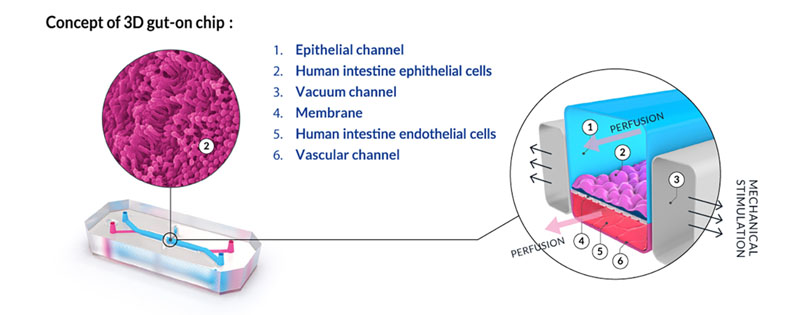Supplements that address immunity have witnessed a notable ascent since the onset of the COVID-19 pandemic. According to Innova Market Insights, there was a 76% increase in products boasting immunity claims between July 2019–June 2020 and July 2020–June 2021 ... and launch activity has remained stable.1
And yet there has been a post-pandemic shift. Although consumers continue to seek immunity supplements, they expect additional benefits — such as energy and stamina, brain-mood health and sleep support — a complete solution and increasingly want to approach well-being holistically.1,2
All these additional benefits lend themselves to the growing awareness of healthy ageing and “inflammageing,” an age-related increase in proinflammatory markers in blood and tissues that contributes to age-related diseases.
Opportunities exist for brands that combine immunity with other proven benefits to attract consumer interest.
BSCU1’s proven immunity support
LifeinU® BSCU1 is a unique and patented strain of Bacillus subtilis that’s registered as CNCM I-2745.
Being a spore-forming probiotic bacterium, it is one of the most stable probiotics on the market. The spore is a “dormant” condition during which the development of the bacterium is suspended.
This form, like a coat, confers superior stability to LifeinU® BSCU1. It has been demonstrated to support immune health in a clinical study that validated its ability to reduce the effects of common infections — especially those related to common colds.
One of the most critical antibodies of the immune system is secretory immunoglobulin A (sIgA).
This antibody is located on the mucosal surface, the most vulnerable interface with the environment.
Mucosal surfaces, such as the linings of the respiratory and gastrointestinal tracts, represent an enormous area of potential exposure to pathogens. sIgA, as an antibody, can catch toxins and infectious agents and inhibit their interaction with the respiratory and intestinal epithelium.
Thanks to the effect of sIgA on pathogens, we can consider them to be the body’s first line of defence. Some factors influence the level of sIgA in the human body, such as age, intensive training, stress and sleep deprivation.
All these different factors directly impact our immune system, weakening our natural defences. To investigate the immunity benefits of this specific strain of B. subtilis, Gnosis by Lesaffre initiated a double-blind, randomised, placebo-controlled clinical trial.
It showed that supplementation with LifeinU® BSCU1 provides a double-protective effect. First, it significantly increases sIgA levels in the respiratory tract by 45% and, in the intestine, by 87%.
Secondly, it is associated with a 31% reduction in the relative risk of reporting an infectious episode. Further, the reduction in the frequency of common colds is a key effect sought by consumers.3,4
To further investigate the benefits of LifeinU® BSCU1, a new in-vitro model was applied that represents a pioneering scientific standard.
Not only can it be adapted for different ingredients and avoid using animal models (making it more sustainable), but it mimics the human model in the preclinical stage as closely as possible to anticipate the results that may be observed during clinical trials.
The new system, called the “intestine-chip,” is a 3D human-printed model. Cells from the intestine are collected and cultivated to recreate a cellular microenvironment that represents the human one.

The 3D human-printed "intestine-chip” model
To test the model on the immune response, researchers have used the intestine-chip, which shows normal epithelial villus morphology and architecture and combines it with immune cells.
Researchers then exposed this intestinal environment to LifeinU® BSCU1. This study proved that supplementation with BSCU1 increases the concentration of sIgA and affects the integrity of the gut mucosal barrier.
It validates that LifeinU® BSCU1 significantly increases the concentration of sIgA in the intestinal lumen, which is consistent with a game-changing human clinical trial.
Clinical work continues: peripheral immune system
Next, the company set out to explore the potential pathways by which LifeinU® BSCU1 could beneficially modulate the immune system and contribute to protection against infection.
A series of complementary immunoassays was selected, including immune phenotyping, gene expression, cytokine levels in LPS-stimulated whole blood and phagocytosis.
Phagocytosis is an important function of the innate immune system that fights and clears infections. The combination of improved responsiveness to microbial challenges and enhanced phagocytic activity gives insight into the mechanisms of action by which BSCU1 may provide defence against pathogens.
Beyond the results regarding cytokine production support during a challenge, one of the new findings relates to a specific condition: inflammageing, an immune dysregulation associated with ageing.
The rise of “inflammageing” and its connection to immunity
Inflammation is a broad term referring to the defence mechanisms that evolved to protect an organism from infection and injury.

Human ageing is characterised by chronic low-grade inflammation and this phenomenon has been termed “inflammageing.” Increasing evidence indicates that inflammageing is intensively associated with many ageing diseases, such as Alzheimer’s, atherosclerosis, heart disease, type II diabetes and cancer.5
Mounting studies have focused on the role of inflammageing in disease progression and many advances have been made in the last decade. Although a moderate inflammatory response is beneficial to the body, it becomes harmful when chronic.
Changes in the inflammatory cytokine network control the direction of the development of inflammation. Yet, sporulated bacteria such as LifeinU® BSCU1, one of the most stable probiotics on the market, offer a viable way to regain control of the inflammatory response.
Recent studies have suggested a major role for endospore-forming bacteria within the gut microbiota as commensal and beneficial members contributing to gut homeostasis.
Within the gut, spore-forming bacteria are known to interact with the host’s immune system, both in vegetative cells and spore forms.6
Game-changing clinical findings
For this exploratory single-arm study with repeated measures, the previously mentioned series of complementary immunoassays was selected.7
Of the 90 participants, three different populations were selected (healthy adults, healthy elderly and healthy children), with each subject serving as its control for 4 weeks of intervention with BSCU1 spores (provided in a daily dosage of 2 x 109 CFU).
The results showed that probiotic supplementation with LifeinU® BSCU1 affects several markers of immunity with a tendency toward stimulating the innate immune response against microbial challenge.
Specific to inflammageing, the study showed that BSCU1 intake reduced low-grade inflammation in the elderly.
Conclusion
Solutions that contribute to the immunity market are in high demand and biotics are already a well-recognised option for many consumers. But many people are looking for more.
Brand owners seeking to meet that need and be on the cusp of innovation have a proven option with LifeinU® BSCU1, which demonstrates consistent efficacy in terms of supporting immune wellness and healthy ageing.
References
- Innova Market Insights, Women’s Health and Immunity (December 2023): www.innovamarketinsights.com.
- www.thehmt.com/news/supplement-report/.
- M. Lefevre, et al., “Probiotic Strain Bacillus subtilis CU1 Stimulates Immune System of Elderly During Common Infectious Disease Period: A Randomized, Double-Blind Placebo-Controlled Study,” Immun. Ageing 12, 24 (2015).
- B. Rodriguez, “A Yeast Product, and a Composition Comprising It, for Use as a Prebiotic Agent,” Patent WO2020152229 (2020).
- S. Xia, et al., “An Update on Inflamm-Aging: Mechanisms, Prevention and Treatment,” J. Immunol. Res. 2016:8426874 (2016).
- N. Koopman, et al., “Mechanisms and Applications of Bacterial Sporulation and Germination in the Intestine,” Int. J. Mol. Sci. 23(6), 3405 (2022).
- F. Mourey, et al., “Modulation of the Peripheral Innate Immune System Towards Increased Phagocytic Capabilities Following Probiotic Supplementation with B. Subtilis CU1,” poster presentation at Probiota 2024 (7–9 February 2024, Milan, Italy).




